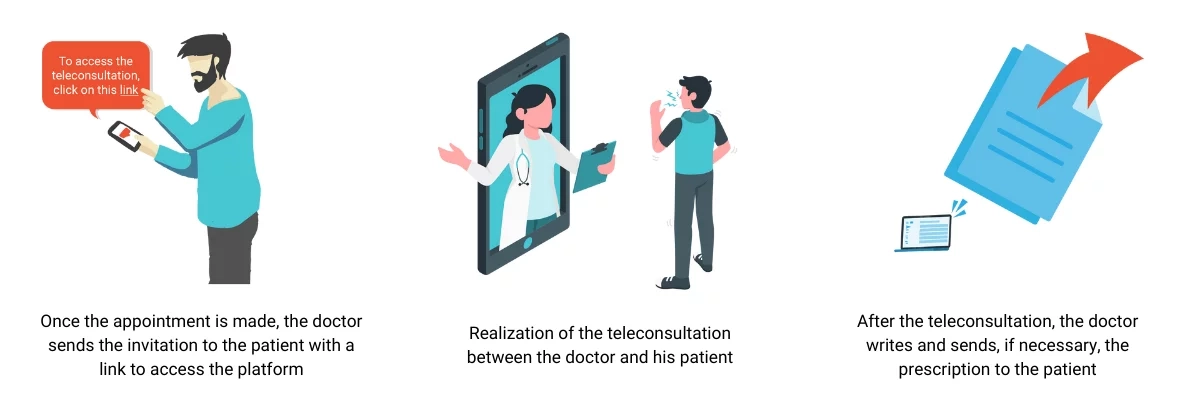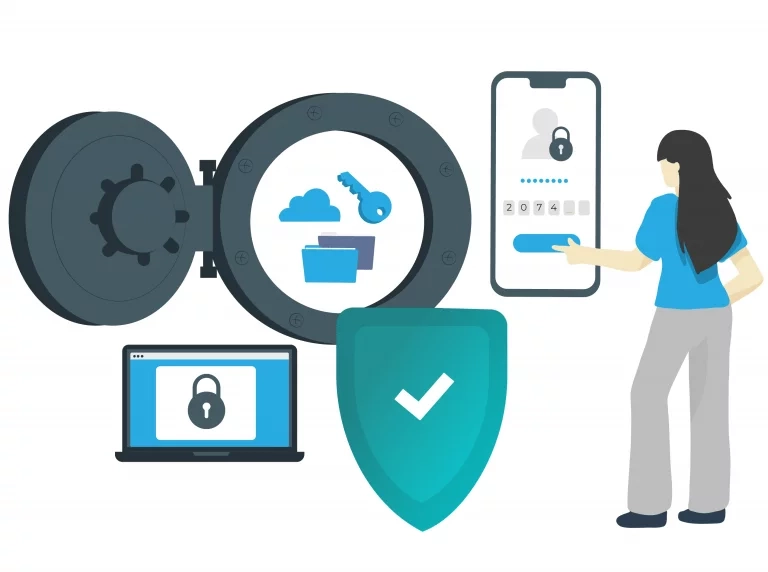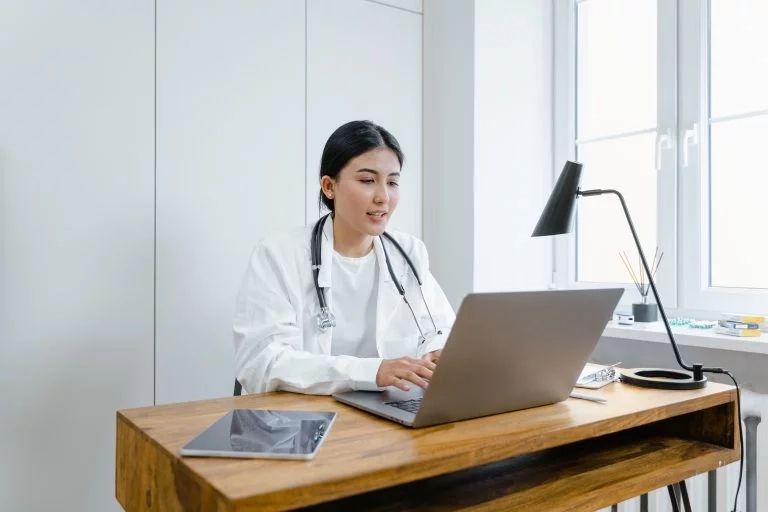[E-Health #1] All about teleconsultation



Telehealth, also known as “e-health” or “digital health”, includes all areas of health that use new information and communication technologies (NICT). The concept of telehealth is divided into two categories: telemedicine and telecare. According to the french public health code, telemedicine is composed of five acts: teleconsultation, tele-expertise, telesurveillance, teleassistance and medical response in the context of medical regulation.
“e-Health” is a series of articles aimed at explaining in detail the concept of telehealth. The objective is to highlight the different existing procedures by explaining for each of them their purpose, their operation, their progress and their implementation. The first part is dedicated to teleconsultation. This is the most well-known procedure, since 92% of French people know about it. It became popular during the Covid-19 epidemic crisis, and is constantly evolving and becoming more and more regulated.
Teleconsultation is a medical consultation performed remotely between a health professional and a patient. This practice is carried out using a communication technology such as videoconferencing. It allows people to be put in contact with each other at a distance via any terminal (smartphone, tablet or computer), as long as it has a camera. Within the framework of a teleconsultation, the patient can also choose to be accompanied by another health professional such as a nurse or a pharmacist, for example. In France, this assistance is reimbursed by the health insurance.
Teleconsultation can be performed by all doctors, regardless of their specialty (general practitioner or specialist), their sector or their place of practice (city office, health center, etc.).
Teleconsultation is open to all patients, regardless of their age, pathology or place of residence. However, it is important to note that only the physician can decide if a teleconsultation is possible. If the physician deems the teleconsultation relevant, then the patient will have to give his or her consent.
Today, teleconsultation is offered to patients in many cases:
Teleconsultation costs the same as a traditional physical consultation (depending on the sector and the professional’s specialty) and is covered by the French health insurance system under certain conditions.

During the Covid-19 epidemic crisis, teleconsultation proved to be a relevant tool to ensure continuity of care on the territory while limiting the spread of the virus. This is why the French health insurance had decided to cover 100% of the teleconsultation procedures. Exceptionally, this measure has been extended until the end of 2021.
From 2022, reimbursement for teleconsultations will again be subject to certain conditions:
Nevertheless, some exceptions to the health care pathway are provided for, notably for patients under 16 years of age, patients who do not have a general practitioner or patients whose general practitioner is not available.
Just as for a physical medical consultation, an appointment with the doctor must be made. Once the appointment is made, the doctor sends the patient an invitation with the date and time of the appointment and a link to access the platform on the day.
The patient can carry out the teleconsultation from home (alone or accompanied), from a teleconsultation cabin or from a doctor’s office (colleague). At the time of the appointment, the patient clicks on the link in the invitation and accesses the videoconference.
Once the teleconsultation is over, the physician writes the appointment report and sends the prescription to the patient by mail or electronically, if necessary. The payment methods for teleconsultation are similar to those of a traditional consultation. However, it is possible on some platforms to pay online by credit card.

Teleconsultation is a practice that tends to become established over time and many doctors have already adopted it. You are a healthcare professional, a healthcare institution, a CSTP, an ESP, a MSP, a mutual insurance company, a company or any other healthcare organization and you are looking to set up a teleconsultation solution within your activity? Discover the key elements to take into account when moving to this remote medical practice.
Initially adopted by the most connected among us, the deployment of teleconsultation is not as complicated as one might think. However, there are certain conditions to respect. They are important, because they allow the good progress of your remote consultations.
Being in a favorable situation to perform teleconsultations
In order to carry out teleconsultations in the best possible conditions, it is important to have suitable premises. Indeed, it is essential to work in a quiet place where the confidentiality of exchanges can be respected. It is also essential to organize one’s activity by providing dedicated time for teleconsultation. Finally, training can be provided to learn how to use computer equipment or to know how to communicate remotely and perform remote examinations.
Having the necessary materials and equipment
The implementation of teleconsultation is subject to the possession of IT equipment. As teleconsultation must be carried out via a video exchange, the doctor must be equipped with a computer, a tablet or a smartphone that has a camera and a microphone. These are usually integrated directly into the equipment. If this is not the case, it is quite possible to invest in an external camera and microphone. In addition, a reliable Internet connection is required to carry out the consultation remotely.
Ensure the protection and security of personal data

Once equipped with the appropriate equipment, the doctor must opt for a secure and approved teleconsultation solution. The chosen solution must guarantee a high level of confidentiality of exchanges, keep health data in a suitable storage environment (HDS) and respect the General Data Protection Regulation (RGPD). There are several platforms that respect these conditions. Solutions such as Skype, WhatsApp, Teams or Zoom should be avoided for teleconsultation. Indeed, they have not been created for the health sector and are therefore not approved to manage and store patients’ personal health data.
The French National Authority for Health also mentions other prerequisites such as regulations, documentation and evaluation to ensure the proper implementation of teleconsultation.
The advantages of teleconsultation are multiple and benefit both patients and physicians. Remote consultation through a video solution allows doctors to see their patients and assess their general condition. In general, teleconsultation simplifies the life of patients, especially for people with mobility problems or people with chronic diseases for example. But also those of health professionals who can avoid certain trips home and save time thanks to more efficient remote consultations. Teleconsultation also allows for better access to care, a reduction in the risk of not seeking care, a reduction in hospital and doctor’s office overcrowding and the fight against medical deserts.
As previously mentioned, the choice of the solution to carry out remote consultations is fundamental, particularly from the point of view of data security. But it is also important to take a closer look at the features offered by the solution’s publisher. The classic functionalities include :

Other functionalities can be proposed depending on the solution:
Did you like this first article? We’ll see you next month for a new article on tele-expertise. In the meantime, don’t hesitate to discover all our other articles related to health.
Are you looking for a teleconsultation solution? Discover Apizee Health, our French and secure turnkey solution or as an API to be integrated. Already used by the GCS e-Santé Bretagne, Innovation e-Santé Sud, the Service de Santé des Armées and the Brigade des sapeurs-pompiers de Paris, Apizee Health is a solution that requires no installation and is quick to deploy. Contact us for a demo of the solution.
Read also:
Explore key findings from the Genesys State of Customer Experience report. Learn how AI, omnichannel strategies, and video chat are transforming CX and enhancing customer satisf...
The State of Customer Experience report by Genesys : Key Insights and Trends
27 Mar 2025
Despite AI and automation, customers still prefer to speak to a human for support. Discover why human interaction remains essential for great customer service.
Why Customers Still Want to Speak to a Human in Customer Service
17 Mar 2025
Discover the top customer experience influencers in Europe, shaping the future of CX and customer service.
Top 100 Customer Experience Influencers to follow
10 Mar 2025
Interested in our solutions?